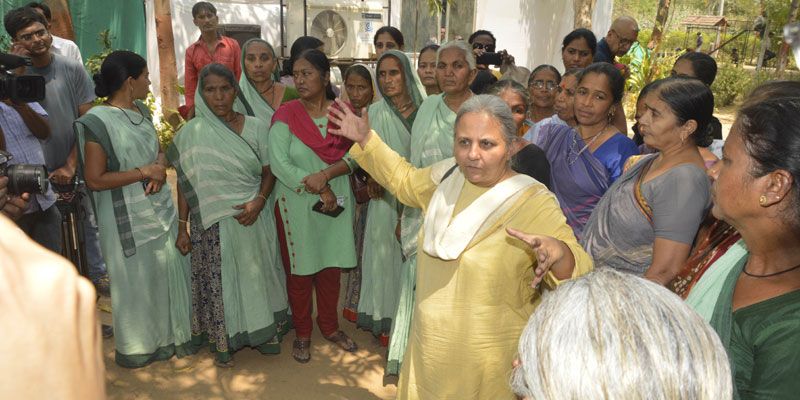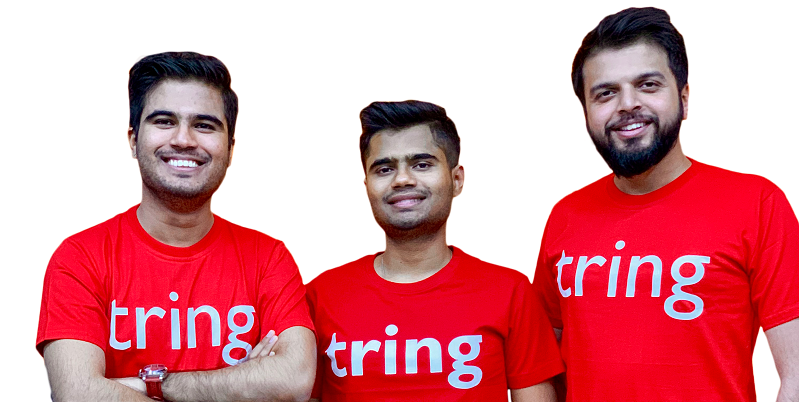Working with women in rural India has taught me creativity, courage and strength - Reemaben Nanavathy
A Padma Shri Awardee, and a renowned social worker. Born in Ahmedabad, Reemaben Nanavathy comes from a family of five sisters. “SEWA (Self-Employed Women’s Association) has been a part of my life for three decades now. I started in 1985,” says Reemaben. It was coincidence that she chanced upon SEWA’s article while appearing for her IAS exam. The article was on the waste collectors in the city of Ahmadabad.
Reemaben was aware of SEWA through her maternal grandfather, Shyamprasad Vasavada, who was the General Secretary of Textile Labour Association (TLA), from where SEWA was founded. She adds that many of the city born children don’t really get engaged and involved in the issues which don’t really matter in their day-to-day lives.

The beginning of a new journey
“And you’re not really sensitive to them. So having read that newspaper article I wrote to SEWA that I would like to come and visit the Organization. After a long break when I was about to go for my trainings, I received an interview call letter. I thought that at least it would give me an opportunity to see the organization and I went for the interview,” says Reemaben.
She was asked by SEWA to come and work and she believed that this would give her a chance to experience and understand poverty first hand. “Like I mentioned, I was city born and I was oblivious to the issues around me. It is one thing to read about poverty and other thing when you actually work with the poor and experience poverty,” adds Reemaben.
Thus began her work with SEWA. It was the first time she visited a village and her first encounter working with rural communities. The year Reemaben joined, Gujarat was experiencing severe drought so she began working in the drought relief programme at SEWA.
Working on ground realities
Reminiscing about her experience, Reemaben says: “I thought that we will go there; work on the relief sites and come back home in the evening. So we left at 6.30 in the morning, reached the drought relief site in the village. I saw the men and women working in the heat and at 5.30 the work stopped and I thought that now everybody would go home. But to my surprise they all moved to another site. We noticed the women digging something. I went to these women and started asking that why don’t you go home? The women responded they were digging up their evening meal. The tubers of the grass they were digging; they would wash, grind and boil it in water and have it with roti. In the extensive field visits and meetings with the village communities. Everywhere the women demanded work. They wanted work to stabilize their household income in their own village.”
This was Reemaben’s first brush with true poverty, she says. It made her understand the Gandhian values that SEWA stands for, which are simplicity and self reliance. According to Reemaben nobody teaches the Gandhian values and philosophy that SEWA believes in. She adds that it is through direct interaction and immersion with the members of SEWA that one gets to understand the importance and relevance of these values of SEWA.
“It made me realize that this is where the real work lies and I decided that I will quit my IAS training and work with SEWA, work with my rural sisters,” says Reemaben.
Everyday inspirations
Reemaben says that from the dayshe began working at SEWA, her biggest inspiration were the poor women who worked hard everyday. She adds that when she sees the women at SEWAare always willing to take opportunities and sometimes even risk their lives and livelihoods, that gives her a lot of strength and courage.
“Sometimes when you are very frustrated, when you see that you worked so hard but things don’t really seem to have worked out when you go back to your members, it gives you the energy, the strength when you see that inspite of their endless struggles if these women are so hopeful and optimistic, then why am I getting frustrated ?” Says Reemaben.
Talking about her journey as a woman social entrepreneur, Reemaben says that being a woman has never hindered her work. Though she hails from a family comprising five sisters, her parents never discriminated or made them feel different from men.

She further adds that she sees this also at SEWA, where it is an enabling environment and a space where women can grow. It helps them innovate and bring out their creativity. She adds that it makes you feel that you too can develop, flourish and learn.
Reemaben adds: “At SEWA we see ourselves as a large family. I always wanted my children – my two boys – to see what work I do and see it as a part of their upbringing and their growth. Therefore, when I leave them behind when I am travelling to the villages where we work they will not feel that my mother is going away somewhere. But they will know that my mother is going there to help women who also have family like ours and therefore I should really support and cooperate with her when she is going away.”
Women leaders and entrepreneurs
Reemaben says that when you work in an organisation, and are trying to lead several thousands or millions of sisters it’s the mutual trust, rapport, relationship, and faith that helps an organisation to work as a family. She adds that one needs to feel a sense of belongingness, a sense of ownership and solidarity.
According to her it has never mattered where someone comes from or how deep their pockets are or which caste, religion or community they belong to. Every woman comes in and they work together as sisters – SEWA sisters. “You don’t separate out your family from your organization but you see the organization as a larger family,” adds she.
On winning the Padma Shri, Reemaben says that it makes her feel happy that the work of all the women at SEWA has received recognition. “Most importantly, it brings even more responsibility. There is added liability to ensure that your efforts remain worth the acknowledgements.”
Her advice to the younger women of today is that it is very important that young women be willing to take on newer challenges, and try out something different and difficult.
“How do you still attempt to do that – not be afraid of failures but see them as a learning exercise. How do you share your joy, growth, development, achievements with your peers and make them also be a part of that process or journey of growth and development,” adds Reemaben.
Inspiring stories at SEWA
Speaking about one incident, Reemaben says that during her initial year at SEWA she lived in Radhanpur a small town in the desert district of then Banaskantha. She says that very often there would be no electricity and clean drinking water for days. “I would very often ask myself; ‘do I really need to go through all this?’ However next day morning when I meet the SEWA sisters who also live in similar or even worse conditions and yet were always smiling, my problems became very trivial,” adds Reemaben.
Also when SEWA began working in Afghanistan and their team was attacked and the centre was bombed, Reemaben says it was a close brush with death. She adds that however after two days, when Reemaben went back to the centre all the 350 women were there greeting and welcoming them.
“They were all telling in one voice we are all together. We are here to protect you. Allah will not allow anything to go wrong and the centre bounced back into full action. This gives me the needed reassurance, the strength and the energy to keep going,” adds Reemaben.








![[The Turning Point] Need to upskill led couple to launch online learning platform for students and professionals](https://images.yourstory.com/cs/2/79900dd0d91311e8a16045a90309d734/turningpoint-800x400option1-1596174232912.png)

![[Product Roadmap] DealShare started on WhatsApp, and evolved into a tech platform with multiple touchpoints](https://images.yourstory.com/cs/2/a9efa9c02dd911e9adc52d913c55075e/Prm-1-1596609450347.png)
